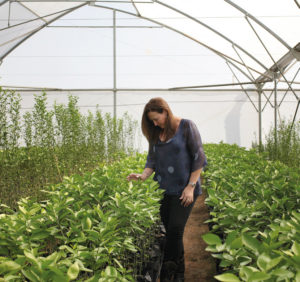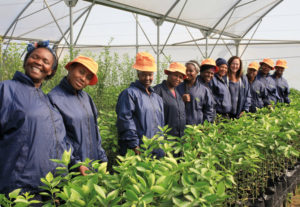Burgeoning market for blueberry growing in South Africa
The figures certainly speak volumes. At the start of 2018, the land used for blueberry cultivation in South Africa amounted to 1600 hectares. At the end of 2019 that is predicted to exceed 2500 hectares. European supermarkets import this superfood from Africa in the winter season. Good substrate from BVB Substrates combined with the skills of dealer Mabu contribute to successful cultivation of these health beneficial berries.
This article focusses on blueberry growing in South Africa and the way BVB Substrates helps South African growers to succeed.
BVB Substrates explored the market opportunities in South Africa a few years ago. It started with casing soil for mushroom growing, but ultimately resulted in substrate for blueberry cultivation. During this search, BVB Substrates met Linda Meyer and her company Mabu in 2015. She explains more about our partnership in this article. We also saw market potential of blueberry cultivation. When BVB Substrates visited blueberry growers in South Africa to gauge their interest in our substrates, Linda accompanied our sales advisors. Her husband is the former coach of the national rugby team in South Africa and knows several ex-rugby players who grow this soft fruit. That’s more or less how we got into that market.
Superfood – blueberry growing in South Africa
The blueberries market is rapidly expanding. And it’s not just South African growers who are responding to the trend, but also producers in the rest of the world. Consumers simply love these berries thanks to their healthy ingredients: fibre, vitamin C and K and manganese. The blueberry is also the queen of the antioxidants, in this case flavonoids. It also contains anthocyanin, which has a positive effect on heart and blood vessels. It’s widely known as a superfood. That explains its explosive growth in popularity.
Supermarkets in Northwest Europe sell this product year-round. In winter many UK retailers, but also Dutch supermarket chain Albert Heijn, like to offer South African blueberries. These are shipped in temperature controlled reefers. Depending on the variety, the berries stay fresh for up to six to eight weeks, if cooled. Blueberries are also a superfood in terms of shelf life.
Ideal substrate
In South Africa, blueberries are grown outdoors in soil or in containers. BVB Substrates supplies reliable substrate for both cultivation methods. In open soil, the blueberry shrubs are planted on ridges. We offer growers white peat which they can mix into the soil. This increases the organic matter content, adds air to the soil and, in addition, lowers its acidity. A pH of five is ideal for blueberry growing. Therefore, adding this component greatly benefits the plants.
Cultivation in containers is popular in regions with stony, clayey soils or a local scarcity of water. In other words, areas in which growing in open soil is difficult. In that case we supply a ready-made mixture of white peat fractions, coco and perlite. It is an airy medium with good drainage properties. Ten years ago, we started trialling this recipe, and it is still showing good results. Blueberry shrubs have a productive life of at least ten to twenty years but are often replaced sooner when a better variety becomes available. The substrate must therefore meet the high expectations for the duration of production. That’s why we supply many growers who are members of four market parties, including BerryWorld and United Exports.
Technical support
This success is not just attributable to the high quality of the product and BVB Substrates’ strong brand. Knowledge and expertise of blueberry growing is also extremely important. Linda Meyer of Mabu is our dealer. Her background as a biologist means she knows a lot about botany and diseases. This specific, in-depth knowledge is of great value to berry growers. The same applies to the technical support provided by the sales advisors of BVB Substrates. Our blueberry specialist at BVB Substrates has accumulated a wealth of knowledge on the total package: planting, substrate, fertilisation and pruning. We visited our South African customers together last October. He helps them find ways of increasing the yields. Our customers highly appreciate this service and support.
Avocados and citrus in South Africa
The approach that is such a success for blueberries could also be a success for other crops. BVB Substrates is currently exploring the potential of a ready-to-use mix for the cultivation of citrus plants and avocado plants. These are two new markets for BVB Substrates. Avocado, like the blueberry, is a growth market thanks to its huge popularity as a healthy food. About four companies in South Africa propagate avocado plants. One of them explained that its order books are full until 2026, which is a good illustration of the buoyant avocado market. The company currently produces its own substrate using imported raw materials. Our R & D department is researching which ready-to-use mix would suit the propagation stage and possible production regions. We certainly see potential, so watch this space.

“I have trust in the products.”
Linda Meyer runs MABU Substrates, a South-African company that produces and sells substrates to mushroom, citrus, vegetable and flower growers. She works closely with BVB Substrates. “I have learned a lot about quality, consistency and handling high volumes.” she explains.
Can you introduce yourself?
‘After completing my PhD in Plant Pathology, I worked at the Department of Microbiology and Plant Pathology at the University of Pretoria. Together with farmers, the research team developed an alternative mushroom casing substrate. I started Mabu in 2010 to commercialise this technology. I am married to Heyneke Meyer, a professional rugby coach. He is currently the head coach of Stade Français in Paris.’
Can you explain more about MABU?
‘Mabu produces and sells various plant growing substrates and composts. The premises are located in Gauteng, where unemployment is a major concern. Mabu currently employs 64 people, of whom 45 are women. They are often the sole providers in their families. Since mid-2016, I have worked with BVB Substrates in the mushroom and blueberry industries.Substrates for blueberry growing in South Africa are the main part of our collaboration.’
What is the added value of the co-operation with BVB Substrates?
‘The size and scale of the BVB Substrates enterprises, added to their 110 years of experience and knowledge are hard to match. The substrates have been validated and perfected over very many years. I have trust in the products, and therefore they are easy to market. In addition I have learned a lot about quality, consistency and handling high volumes. I also picked up a great deal from BVB Substrates regarding customer care and after sales service.’
What opportunities do you see for your business?
‘The blueberry industry in South Africa is expanding rapidly. It is our main focus at the moment. We want to add value to growing protocols. Moreover, we strive to support blueberry growers who use peat-based substrates. Being an avid mountaineer who has climbed high altitude mountain peaks all over the world, I do love a challenge!’

